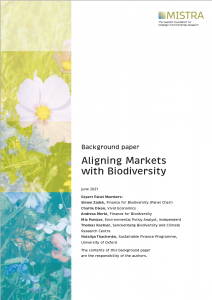Research to identify the harmful connections between the global economy and biodiversity losses is urgently required. Most critical is the need for research on potential action to end this association. This is the message of a background paper on biodiversity and the financial system compiled by Mistra’s expert panel.
How can the financial sector change course towards investing in ways that benefit and strengthen biodiversity? Having identified this as a research area in need of funding, Mistra is therefore working on a forthcoming call for research proposals, preliminarily planned to open this autumn. As part of Mistra’s research initiation process, an international expert group was commissioned to write a background report on the area: Aligning Markets with Biodiversity.
‘In meetings with Mistra’s asset managers, it’s increasingly clear that biodiversity is now seen as a crucial issue where sustainable investments are concerned. At the same time, knowledge of what should and can be measured is lacking, and there are great uncertainties about data. To promote global biodiversity and reverse the trend of species losses, we need a makeover of the financial system. The system must shift from investments and subsidies that deplete nature to ways of valuing, and sustainably using, nature’s diversity and resources. Several new initiatives are under way in the financial sector to bring the issue to bear in investments, but assessment and quantification of biodiversity are complex, and we at Mistra see that research and innovation are needed here,’ says Linda Bell, Programmes Director at Mistra.
The background paper, Aligning Markets with Biodiversity, is being released in conjunction with the Mistra Dialogue webinar The Missing Link — Biodiversity and our Financial System at 10:00 a.m. on 23 June. The expert panel comprises Simon Zadek and Andreas Merkl of the Finance for Biodiversity (F4B) Initiative; Charlie Dixon of Vivid Economics; Mia Pantzar, Independent Policy Analyst; Thomas Kastner of the Senckenberg Biodiversity and Climate Research Centre; and Nataliya Tkachenko of the Oxford Sustainable Finance Programme, University of Oxford.
‘For biodiversity to be a sustainable foundation of the global economy requires us to better understand its dynamics, risks and opportunities, today and into the future. Building this understanding requires that we support innovative research that blends and applies the best of what we know about economy and finance, biodiversity and data sciences. This paper sets out exactly such a research agenda that we hope will serve to strengthen the development of tomorrow’s biodiversity-friendly economy,’ comments Simon Zadek, Chair of the Finance for Biodiversity Initiative, who has headed the work on the background paper.
Aligning Markets with Biodiversity finds that the links between biodiversity and the global economy are rapidly growing in importance for political decision makers and market players. Interest is bound up with an understanding of the climate crisis, and the growing perception of the importance of what the natural environment contributes to our economy, and of the increasing fragility of ecosystems. The expert panel writes that this expansion in interest has been boosted further by both scientific and popular narratives about the COVID-19 pandemic as an example of our problematic relationship with nature.
The authors also highlight the importance of avoiding undesirable and unforeseen effects of the financial sector’s greater focus on biodiversity. Here, it is important to build up knowledge of the effectiveness of conservation measures through regulation, governance and policy development, nationally and internationally, at the same time.

The background paper emphasises, in particular, the importance of:
- Properly functioning markets for biodiversity as a transformative tool for change.
- Giving more weight to biodiversity aspects in financial decision-making, so as to steer global financial flows from negative to positive effects on biodiversity.
- Robust, standardised and verifiable data that both reflect impacts on biodiversity and are available to the financial sector.
- Effective management of markets that affect biodiversity, to ensure that they boost value for ongoing efforts to conserve and restore biodiversity.






